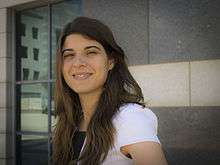Kira Radinsky
Kira Radinsky is a Ukraine-born Israeli computer scientist, inventor and entrepreneur, specializing in predictive data mining.[1][2]

She gained recognition after her software predicted the first in 130 years outbreak of cholera in Cuba. The prediction was made based on the pattern identified by mining of 150 years of data from various sources: in poor countries, floods within a year after a draught often follow by a cholera outbreak.[1] The disaster-prediction software was developed together with Eric Horvitz while she was an intern at the Microsoft Research during her Ph.D. work at the Technion.[1][3]
—Kira Radinsky, 2019.[4]
While working on her Ph.D. she co-founded company, SalesPredict, based on similar ideas, but with different algorithms (the intellectual property of her internship work belongs to Technion).[3] It was acquired by eBay Israel in 2016, where Kira Radinsky worked as chief scientist and the director of data science during 2016–2019.[5]
Since 2019 she is Chairwoman & Chief Technology Officer at the Diagnostic Robotics, Jerusalem, which she co-founded in 2017.[6]
She is also visiting professor at Technion teaching the applications of predictive data mining in medicine.[7]
She has co-authored over 10 patents.[5]
Awards and recognition
- 2016 selected as the "Woman of the Year" by the Israeli Lady Globes magazine.[8]
- 2015 Included into the Forbes Israel "30 under 30" young innovators and entrepreneurs list [9]
- 2013: Included into the MIT Technology Review's "35 Innovators Under 35" list[1]
References
- "35 Innovators Under 35/Inventors/"Kira Radinsky, 27 "How good can computers get at predicting events?", by Matthew Kalman
- "This Israeli Wants to Save the World With Big Data - and Still Protect Your Privacy", JHaaretz, August 7, 2018
- "The Israeli who can predict the future"
- "Can AI Predict Humanity's Future Events?". November 23, 2019.
- "Can AI Predict Humanity's Future Events?", November 23, 2019 Psychology Today
- "https://www.calcalistech.com/ctech/articles/0,7340,L-3773621,00.html"
- "Kira Radinsky ChairWoman & Chief Technology Officer at Diagnostic Robotics"
- Dr. Kira Radinsky Named Lady Globes Magazine's "Woman of the Year"
- "Forbes Israel releases inaugural 30 under 30 list"
External links
- Kira Radinsky on LinkedIn
- Kira Radinsky personal website